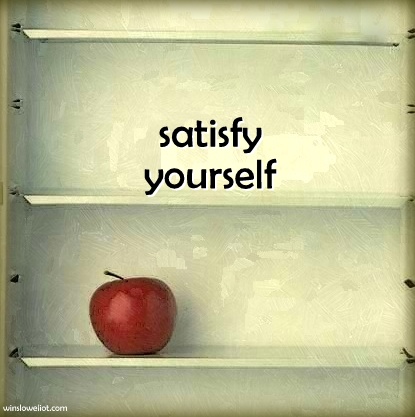
4-27: I typically begin my day with a cup of coffee, made from freshly-ground, organic, dark-roasted beans and our delicious well water that bubbles up from the clear springs high up in the mountains where we live. I haven’t been feeling well lately, so for several days I’ve subsisted on chamomile tea or hot water and lemon instead. This morning, however, I woke feeling much improved in health and spirits, and was grateful for my coffee again. I realized something about its deliciousness: the fragrance of freshly ground coffee beans is intoxicating. Then you take a sip and it’s the best taste in the world. Nutty, toasted, rich: It is so good. But by the time you’re halfway through the cup, you hardly taste it anymore. It’s like water with coffee flavoring.
This is true with anything we crave: potato chips, chocolate, wine, money, kisses, or time. There’s a delightful anticipation in the craving, then there’s the thrill of possession, and then almost right away it no longer gives us that same initial bliss. But instead of letting it go, we tend to crave more of it. We claw at recreating that first rush of pleasure, and so we dig deeper into the bag of chips or we fill our time with more and more activities, as though that way we’ll make more time. But, it turns out, nothing is endlessly satisfying.
More is not better. More does not create more. If you go down that route, there is never enough. So what’s the solution to craving more of anything? How do we live into that first heady delight of a first sip of coffee or the first bite into a piece of dark, rich chocolate, so that it is enough?
In life we tend rarely to feel satisfied. We always want more. If we didn’t, we’d stagnate or be vegetative. But did you know that the word satisfaction originated from the same Indo-European root that gives us the word sad? In Middle English, sad means sated, tired, satisfied. When we’re sated, as we are after a delicious lunch, we’re quiet, muted, tired. Satisfaction means making sated, which means making sad.
So perhaps it’s our human desire never to remain satisfied—to always want to change and grow and transform and thrive. There’s really only way to do that, and that’s by living in the here and now. That first sip of our favorite morning beverage brings us utterly into the present moment—and to the awareness that the present moment is joy.
Yes, it is possible to sustain those “first sip” experiences, when anticipation, experience, and satisfaction blend into a single moment of pure bliss! It’s through mindfulness. It’s funny to think of mindfulness as bliss, but so it is. It’s the only way to feel fulfilled without being sad. Take your first sip from a place of stillness and delight. Grow very aware of it. After a while, take another one. It’s hard to keep eating an entire bag of potato chips mindfully. You’ll find yourself content with two or maybe three.
So what do you crave? What do you long to have more of? When I was young, I hungered for more reading time. I craved the longest, most complicated, intense stories. I read fast and furiously, like a hurricane tearing through the pages, as though the more I read, the more I’d feel satiated. Now I try to read more slowly and with more discrimination and I’m satisfied with fewer words and more thought.
Think about that word—satisfaction. What satisfies you? On the surface you might believe that it’s a job well done, a good meal that has stuffed you, or a healthy hike up a mountain. But that’s about accomplishment and the past, and is actually kind of sad since you’re not doing it any more. Instead, look to the present: the only thing that is really satisfying is this moment. Make it the best it can be by putting your fullest attention on it, and it alone.
